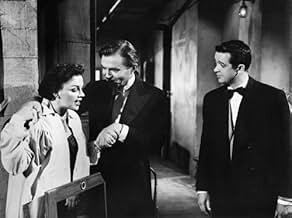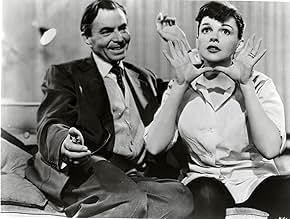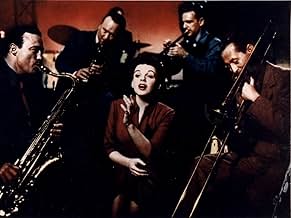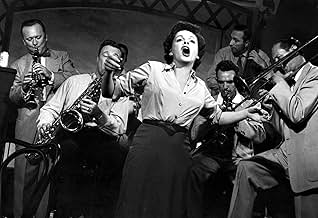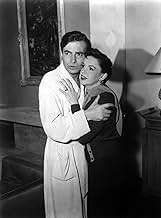IMDb RATING
7.5/10
21K
YOUR RATING
A fading matinee idol helps a young singer and actress find fame, even as age and alcoholism send his own career on a downward spiral.A fading matinee idol helps a young singer and actress find fame, even as age and alcoholism send his own career on a downward spiral.A fading matinee idol helps a young singer and actress find fame, even as age and alcoholism send his own career on a downward spiral.
- Nominated for 6 Oscars
- 7 wins & 14 nominations total
Tommy Noonan
- Danny McGuire
- (as Tom Noonan)
John Alban
- Academy Awards Attendee
- (uncredited)
Laurindo Almeida
- Guitarist
- (uncredited)
Leon Alton
- Usher
- (uncredited)
Rudolph Anders
- Mr. Ettinger
- (uncredited)
David Armstrong
- Soundman
- (uncredited)
Phil Arnold
- Agent #3
- (uncredited)
Nadine Ashdown
- Esther - Age 6
- (uncredited)
Gertrude Astor
- Racetrack Spectator
- (uncredited)
Featured reviews
Much has been written about this movie (to extremely great length) in other reviews, so I'll try to keep this fairly brief and concise.
First, the restored version runs at 176 minutes. The movie originally ran at 181 minutes, but was cut to 154 minutes when theater owners complained that they were losing money due to the excessive length. The cut destroyed the integrity of the movie - director Cukor never saw the movie again. However, the restored version contains stills to replace some of the cut footage, and gives a better sense of the film's power and scope.
Second, all four major studio versions of the story (including "What Price Hollywood?") have their own merits and differ greatly from one another. If you like the story, see them all and compare for yourself. It's quite fun to compare!
Third, definitely see this version for Judy. Sure, Judy's "The Man That Got Away" may be the greatest musical moment on cinema, but it's her dramatic performance that will keep your attention over almost three hours. James Mason is on target, and the supporting cast is fine, but Judy just dominates the screen. It's an opportunity to see a true genius in action at the absolute height of her powers. For more dramatic Judy, see her in "The Clock".
George Cukor was acclaimed as the great director of actresses, and he raises Judy to the height she deserves. I love Judy. This is a 10 out of 10.
First, the restored version runs at 176 minutes. The movie originally ran at 181 minutes, but was cut to 154 minutes when theater owners complained that they were losing money due to the excessive length. The cut destroyed the integrity of the movie - director Cukor never saw the movie again. However, the restored version contains stills to replace some of the cut footage, and gives a better sense of the film's power and scope.
Second, all four major studio versions of the story (including "What Price Hollywood?") have their own merits and differ greatly from one another. If you like the story, see them all and compare for yourself. It's quite fun to compare!
Third, definitely see this version for Judy. Sure, Judy's "The Man That Got Away" may be the greatest musical moment on cinema, but it's her dramatic performance that will keep your attention over almost three hours. James Mason is on target, and the supporting cast is fine, but Judy just dominates the screen. It's an opportunity to see a true genius in action at the absolute height of her powers. For more dramatic Judy, see her in "The Clock".
George Cukor was acclaimed as the great director of actresses, and he raises Judy to the height she deserves. I love Judy. This is a 10 out of 10.
Who would have thought? Cukor, never having worked in colour before AND never having worked in widescreen before did the best piece of work of his career here. 'The Man That Got Away' is always considered one of the best musical numbers to come out of old Hollywood: but wait until you've seen it in widescreen. It's not even the same number, and you get why people who've seen this film in theatres revere the number. Some of the compositions (especially during the opening set piece) aren't just Cukor's best work, they rival anyone's from that era. Let me reitierate: see it in widescreen or trust those of us who have. This musical/ melodrama/tragedy set the bar so high that 50 years later people remember this film but not the musical that got a best picture nomination that year, OR, the performance that won Best Actress that year.
Count me among those who love this film, but am I the only one who feels for Libby, played by Jack Carson? Yes, he's snide and spiteful, but for God's sake, who wouldn't be in his shoes? When he says, "Norman Maine's charm escapes me." I tend to agree with him. What makes this violent drunk so special anyway, except that he's played by James Mason? And, although she's played by Judy Garland at her radiant best, isn't Esther a classic co-dependent wife? Have any of you adoring fans ever actually dealt with a close one who's alcoholic?
When the studio mogul says, after Norman Maine dies, "you didn't know him at all," I feel like arguing the point. Libby should say, "Maybe YOU didn't know him, Oliver. Did he ever insult you for making him do his job? Did he ever punch you out? Did you ever have to continually face his dirty side, as I did, which he--and you too, Oliver--refused to confront?"
Maybe I'm a poop. But I had to say it.
And, yes, it's a brilliant film.
When the studio mogul says, after Norman Maine dies, "you didn't know him at all," I feel like arguing the point. Libby should say, "Maybe YOU didn't know him, Oliver. Did he ever insult you for making him do his job? Did he ever punch you out? Did you ever have to continually face his dirty side, as I did, which he--and you too, Oliver--refused to confront?"
Maybe I'm a poop. But I had to say it.
And, yes, it's a brilliant film.
The 1954 musicalized version of A Star Is Born is a great film. Judy Garland and James Mason (both Oscar nominated) turn in terrific performance as Esther and Norman. Like its 1937 predecessor (which starred Janet Gaynor and Fredric Marchboth Oscar nominated), the 1954 version follows the ups and down of two people set against the vicious world of Hollywood. The newer version sticks to the basic story but adds some great numbers for Garland, including "The Man That Got Away" and "I Was Born in a Trunk." In a major comeback, Garland had not worked in films since Summer Stock (1950), and her performance here is the best of her career. That she lost the Oscar to Grace Kelly for The Country Girl is one of Hollywood's great inequities. Mason lost to Marlon Brando for On the Waterfront. Garland sings superbly and is a great comic and dramatic actress. Her Esther is more vulnerable than Gaynor's just as Mason's Norman is more pathetic than March's. I love both versions. Charles Bickford and Jack Carson play the other major parts, played by Adolphe Menjou and Lionel Stander in 1937. Two major supporting roles from the 1937 version were cut from the 1954 version: Esther's first Hollywood friend (Andy Devine) and her intrepid grandmother (the great May Robson). But Garland's musical numbers make up for their absence. Oddly, despite the great hullabaloo surrounding A Star Is Born, it was not nominated for best picture, and George Cukor was bypassed in the directing category. One of the best musicals ever made.
Marked by a pervasive sense of melancholy, the 1954 musical version of the familiar Hollywood warhorse will forever be remembered as Judy Garland's most acclaimed work in films. Even though she would go on to a handful of films in the early 1960's, this was her last leading role in a major Hollywood production, an ironic point since she plays an emerging movie star on the rise. True, she doesn't look her best in the film, but her fulsome talent is on full, heart-wrenching display as Esther Blodgett, an obscure but thriving band singer who becomes movie star Vicki Lester thanks to Norman Maine, an alcoholic has-been movie star in career free-fall. Their love story and the opposing trajectories of their careers are tracked meticulously by Moss Hart's shrewdly observed screenplay and George Cukor's sensitive direction.
The double-sided 2000 DVD provides the 176-minute restored version, which is just five minutes less than what was shown at the original premiere. Until 1983, the half-hour of footage excised after the premiere was thought lost, but film historian Ron Haver found much of it and supervised an extraordinary restoration effort that includes a necessary albeit brief use of production stills to match up with the complete soundtrack. Even with such technicalities, the resulting film is even more of a landmark musical drama, emotionally resonant in spite of certain pacing issues with the storyline. Cukor's approach is probably more leisurely than the relatively hard-boiled material requires since he includes so many establishing and lengthy shots, but his direction shows his legendary sensitivity toward actors.
While he comes across a bit too robust as a fading matinée idol, James Mason vigorously captures Norman's scornful pride and self-pity. He may lack Fredric March's innate sense of vulnerability in the original, but Mason makes the character's inner torment more palpable. As for Garland, she brings so much of her own history to Esther/Vicki that her scenes feel alive with her vibrant, masochistic personality. She is aided immeasurably by the masterful songs of Harold Arlen and Ira Gershwin, most significantly her torchy rendition of "The Man That Got Away", as perfect a musical movie moment as has been ever produced. While her work in the fifteen-minute "Born in the Trunk" sequence is impressive, it is really later in the film when she soars, in particular, when she segues from the tap-happy "Lose That Long Face" into a breakdown scene in her dressing room with sympathetic studio head Oliver Niles portrayed with his typically stentorian fervor by Charles Bickford.
The print condition and sound quality on the DVD are superb. There are also some fascinating extras on the B-side starting with three alternative takes on "The Man That Got Away", each distinctive in presentation with costume and lighting changes, a must for Garland fans. Also included is a very brief deleted number within the "Born in the Trunk" sequence", "When My Sugar Walks Down the Street". Three vintage pieces have been gathered - a brief newsreel piece of the premiere, a four-minute clip of the Coconut Grove premiere party held after the premiere, and most interestingly, a half-hour kinescope akin to the current-day red carpet pre-shows with an amazing parade of period stars expressing little more than good wishes on their way to the theater. Lastly, the theatrical trailers for all three versions of "A Star Is Born" are also included.
The double-sided 2000 DVD provides the 176-minute restored version, which is just five minutes less than what was shown at the original premiere. Until 1983, the half-hour of footage excised after the premiere was thought lost, but film historian Ron Haver found much of it and supervised an extraordinary restoration effort that includes a necessary albeit brief use of production stills to match up with the complete soundtrack. Even with such technicalities, the resulting film is even more of a landmark musical drama, emotionally resonant in spite of certain pacing issues with the storyline. Cukor's approach is probably more leisurely than the relatively hard-boiled material requires since he includes so many establishing and lengthy shots, but his direction shows his legendary sensitivity toward actors.
While he comes across a bit too robust as a fading matinée idol, James Mason vigorously captures Norman's scornful pride and self-pity. He may lack Fredric March's innate sense of vulnerability in the original, but Mason makes the character's inner torment more palpable. As for Garland, she brings so much of her own history to Esther/Vicki that her scenes feel alive with her vibrant, masochistic personality. She is aided immeasurably by the masterful songs of Harold Arlen and Ira Gershwin, most significantly her torchy rendition of "The Man That Got Away", as perfect a musical movie moment as has been ever produced. While her work in the fifteen-minute "Born in the Trunk" sequence is impressive, it is really later in the film when she soars, in particular, when she segues from the tap-happy "Lose That Long Face" into a breakdown scene in her dressing room with sympathetic studio head Oliver Niles portrayed with his typically stentorian fervor by Charles Bickford.
The print condition and sound quality on the DVD are superb. There are also some fascinating extras on the B-side starting with three alternative takes on "The Man That Got Away", each distinctive in presentation with costume and lighting changes, a must for Garland fans. Also included is a very brief deleted number within the "Born in the Trunk" sequence", "When My Sugar Walks Down the Street". Three vintage pieces have been gathered - a brief newsreel piece of the premiere, a four-minute clip of the Coconut Grove premiere party held after the premiere, and most interestingly, a half-hour kinescope akin to the current-day red carpet pre-shows with an amazing parade of period stars expressing little more than good wishes on their way to the theater. Lastly, the theatrical trailers for all three versions of "A Star Is Born" are also included.
Did you know
- TriviaGeorge Cukor offered Marlon Brando the role of Norman Maine on the set of Jules César (1953). "Why would you come to me?" asked Brando. "I'm in the prime of my life... If you're looking around for some actor to play an alcoholic has-been, he's sitting right over there"- pointing at his costar James Mason, who got the part.
- GoofsAfter Vicki comes home and she performs in her house for Norman, the doorbell rings and he goes to the door to accept a package for Vicki. His hair is all mussed-up when he goes to the door, but after he closes it and the camera goes back to him, there isn't a hair out of place. Then he walks over to where Vicki is and his hair is all mussed-up again.
- Quotes
[last lines]
Vicki Lester: Hello, everybody. This is Mrs. Norman Maine.
- Alternate versionsContrary to popular belief, the film was not originally at 181 minutes, but rather 196 (3hrs. and 16mins.) at a post-premiere shown on August 8, 1954 in Huntington Park, California. After its second post-premiere - the very next day - two scenes of 15 minutes total were deleted; making the film run its original world debut length at 181 minutes. One was a number called "When My Sugar Walks Down the Street" that came after Judy's take of "I'll Get By" in the 'Born in the Trunk' sequence, the other was a scene where Garland and James Mason's characters (Vicki and Norman) were picnicking on the beach; production stills and promotional advertisements are the only thing left in existence of the footage. After its world premiere on September 29, 1954, 27 minutes was cut, bringing it down to a mediocre 154 time length. Those scenes were:
- 1) Esther quitting the band
- 2) The Trinidad Coconut Oil Shampoo
- 3) Esther working at a drive-in
- 4) Norman being driven away drunk in his car
- 5) Norman inquiring Esther's old landlady
- 6) Spotting Esther on the TV commercial
- 7) Tracking down Esther at her new boarding residence
- 8) Driving down the strip - Esther getting sick
- 9) "Here's What I'm Here For" musical number - Norman proposes
- 10) "Lose That Long Face" musical number - Vicki breaks down
- ConnectionsFeatured in Film Night: Special: Forty Years in Hollywood (1970)
- SoundtracksGotta Have Me Go with You
(uncredited)
Music by Harold Arlen
Lyrics by Ira Gershwin
Performed by Judy Garland with Jack Harmon & Don McKay
Details
Box office
- Budget
- $5,019,770 (estimated)
- Gross US & Canada
- $4,335,968
- Gross worldwide
- $4,350,001
- Runtime
- 2h 34m(154 min)
- Aspect ratio
- 2.55 : 1
Contribute to this page
Suggest an edit or add missing content








